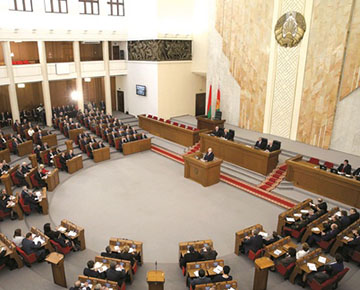The President delivers the annual State of the Nation Address to the Belarusian People and the National Assembly
Economic issues are the centre of attention, with Alexander Lukashenko putting special emphasis on them. Moreover, the improvements
to the pension system, healthcare, and education are priorities. The main principles of the country’s foreign policy and personnel strategy are also in the spotlight.
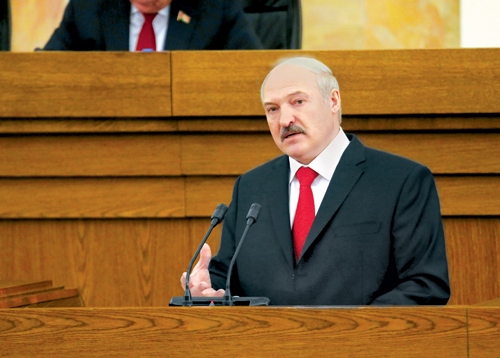
On short-term prospects
In the beginning of the annual State of the Nation Address the President asserted that it isn’t a long-term programme of the country’s development strategy. This will be tackled at the fifth All-Belarus People’s Assembly. Now, it’s more important to speak about the nearest goals and concrete tasks for this year. “I attach special significance to this year. So do you. There’re a lot of reasons for this. First of all, this year starts a new five-year period of development. It should become a turning point in overcoming the negative trends in the economy,” stressed Mr. Lukashenko.
In the last 2-3 years the pace of economic development has slowed down. Though the external factors were mainly to blame for this, we still need to recognise that we had made mistakes too. “We’re lagging behind the advanced countries in the level of labour productivity, cost of energy, materials, and, ultimately, the competitiveness of goods and services. To counter threats to our economic security, we must be enterprising and well-organised. Moreover, we must mobilise all the resources and skills to operate effectively. We’ve talked about this many times,” said the Head of State. Mr. Lukashenko is convinced that the year will be a serious test for all branches of power and administrative structures. It will show who is capable of overcoming difficulties.
On global financial organisations
There is a great investment potential in co-operation with international financial organisations. This will open up doors for many large investors, and the development of interaction with the International Monetary Fund requires close attention. Of course, the Belarus-IMF programme is not a panacea but an indicator of openness of our economy. Mr. Lukashenko accentuated that while talking to the IMF the Belarusian side should protect its own interests, ‘arguing in its own favour, explaining, and demanding understanding from the other party’.
Meanwhile, $600m from the project portfolio of the World Bank for Belarus haven’t been utilised yet because of sluggishness of state bodies. Mr. Lukashenko paid attention that till the end of the year these issues should be settled and demanded to eliminate bureaucratic barriers for the involvement of funds of international financial organisations into the country’s economy within shortest possible time.
On culture
Mr. Lukashenko pointed out that a special feature of the year 2016 is that it has been declared the Year of Culture. “The decision was made keeping in mind that culture, in its broad sense, should play a more active role in uniting people around constructive goals, high moral principles and our good traditions in the continuing deep process of building an industrious, educated, spiritually rich and healthy nation,” stressed the President.
The emphasis will be placed on the artistic and creative sector. Meanwhile, special attention should be also paid to other areas, including production standards and culture of farming, everyday life and interpersonal relations, development of cities and villages, and cautious preservation of historical heritage.
Solid funds from the Republican and local budgets have been allocated for the implementation of the Culture of Belarus state programme for 2016-2020. The President’s position is unanimous, “The Government and local authorities should obligatory remember that each Rouble, injected into the construction and reconstruction of culture facilities, should bring benefit. Nesvizh, Mir and the Great Patriotic War History Museum are good examples, but what’s next?”
Mr. Lukashenko paid attention to the necessity of systematic approaches in the cultural sphere. When will a systematic approach be launched for modernisation of cultural institutions which are of Republican importance? The major task in the Year of Culture is activation of intellectual and spiritual powers of the society.
On investments
“The major stimuli for investments are clear and understandable regulations and laws which are observed by both Belarusian and foreign investors. However, if there’re economic regulations impeding the process of raising investments, it’s necessary to respond promptly and to flexibly adapt these regulations to the changing real situation,” noted the Belarusian leader. In this respect, the President has instructed the Government to analyse and systematise the investment legislation and put forward corresponding proposals by September 1st.
The task for this year is the attraction of at least $1.5bn of direct foreign investments. China is nowadays one of the largest investors which has opened for Belarus a credit line — worth $8bn.Moreover, this sum can be raised; the most vital condition is the implementation of projects.
Our country is actively looking for new growth points of the economy that will ensure its sustainable development. Mr. Lukashenko is convinced that the Chinese-Belarusian Industrial Park should become such a point. “A venue is being established here to attract high-tech and competitive projects,” emphasised the Head of State. “Moreover, the enterprises of the yesterday and today have nothing to do on this venue. Why? Primarily because we won’t be able to sell their produce here, in the European Union and worldwide.”
On import substitution
“Belarus has been involved in import substitution for several years already. However, now a new impetus and sense should be given to this area. There’re quite many spheres of application,” noted Mr. Lukashenko, believing that it’s primarily necessary to expand the volumes of production localisation at joint enterprises. “Having large assembly facilities in Belarus we still import components from abroad: seats, finishing materials, automobile windows, and car components. Meanwhile, these should be manufactured locally and this is the niche for our entrepreneurs and areas of concrete work for the country’s economic staff.” The key parameter determining the efficiency of the governmental work in this direction has been determined: the growth of at least $600m of import-substitution produce each year.
The President read out aloud the requirement towards enterprises: they should independently take all commercial loans proceeding from their business plans, without state guarantees.
On social justice
“Under the current conditions it’s very difficult for the state to maintain social orientation and principles of social equality. However, we rely on this and will continue, despite difficulties,” assured Mr. Lukashenko. “My pre-election programme stipulated Belarus’ development as a social state as one of the most important tasks; its major concern is to create conditions to unleash human potential.” Meanwhile, the level of civilisation and humanness of the society is primarily determined by its attitude towards children and elderly people, so the provision of social support to people with reduced capabilities should become one more area of the Government’s activity. “We’ve always had an attentive attitude to the needs of the Great Patriotic War veterans and other war veterans. Even before other states in the Eastern Europe and the CIS we’ve solved their problems, including the most complicated — housing — while remembering about their unprecedented courage and firmness. During all these years we have conducted and we’ll continue taking measures aiming to improve the quality of life of these people.”
On growth factors
Mr. Lukashenko asserted that all costs for production and sale of produce should be primarily reduced for sustainable development. “This is a strategic area to enhance economic competitiveness. It tackles each working place, technological section, plant, agricultural enterprise, region and branch. I’d like to especially underline that a task to ensure the reduction of costs by at least 25 percent has been set up before state bodies, and it should be fulfilled.”
The focus should be first of all made on the launch of efficient control methods, the use of contemporary quality standards and technical specifications. The refusal of enterprises and organisations from dishonest intermediaries is a significant factor in reducing the costs of the produce; these use ‘grey’ schemes to ‘skyrocket’ prices in their favour during the supplies of raw materials, spare parts or components, especially from abroad.
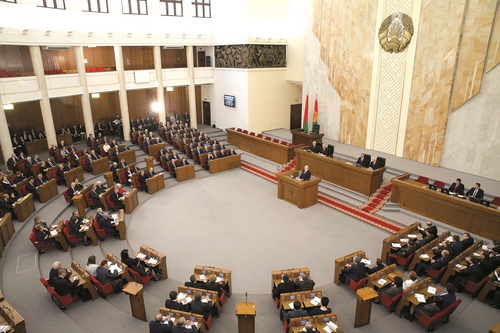
On industry and agribusiness
The President accentuated attention that the world is actively shifting towards new industrial policy. “The development dynamics is determined by new sectors of economy, based on IT, bio, and nano-technologies. Commodities — traditional for the market — acquire a new life at the expense of contemporise consumer properties and innovative solutions. We also need to take into account this reality during the formation of investment plans.” Therefore, one of the Government’s tasks is to ensure the implementation of potential of modernised enterprises from basic branches of the economy and to accelerate the development of new high-tech sectors.
Meanwhile, agriculture has also its role to play. “Belarusian food products are recognisable and popular. This is primarily the merit of our advanced households. Unfortunately, their number isn’t sufficient. The most vital element of recovery of rural economy is bringing those lagging behind to the level of average, and the latter to the level of best workers,” asserted the President.
On entrepreneurs
Mr. Lukashenko confirmed that the previous position won’t be changed, “The state protects and will continue protecting the rights, property and dignity of all entrepreneurs who are doing their business honestly. However, we may expect steadfast implementation of laws, ‘exit from darkness’ and refusal from tax dodging.”
Improvement of business environment is a constant process. There’re positive results which are proven by international experts. In the WB’s Doing Business-2016 latest report our country is ranked 63rd out of almost 200 countries in ‘Taxation’ — up 126 positions within five years. The President set the goal for the future: to enter top thirty countries in doing business conditions.
“What impedes to do business in our country? Everyone blamed the permissive principle. We’ve changed it to declarative. Now one just needs to write an application and do their business. Meanwhile, if someone wants to do business exclusively for the sake of their own interests and in the way they see it, without taking into account our legislation, there’s no place in Belarus for such entrepreneurs. We need to stop this argument; no one needs it, because a great deal of businessmen doesn’t take offence at anything; they have now registered and work honestly. The most important is to pay taxes and you may sleep calm.”
On innovations
Mr. Lukashenko has charged the Government to prepare a state programme of innovative development by July 1st, 2016, “The trend in economy is absolutely different: the main riches are brains, science and innovations, rather than what the God has put into the ground.” The National Academy of Sciences and the High-Tech Park come to the forefront in the implementation of the innovative strategy, “We were discussing for a long time a new format of work of the National Academy of Sciences, the creation of scientific innovative-industrial co-operation focused on the formation of high-tech sector based on its own research and technological base. I believe that today the Academy of Sciences can intensively develop space activity, nano- and bio-industry, and robotics.” Real return from capital investments into scientific sphere, rather than the cost-based principle, should be the basis for assessment of activity of the NAS of Belarus, the High-Tech Park, the Chinese-Belarusian Industrial Park and techno-parks.
On health
The public health services sphere is a priority in our country. For this reason the President demanded, “There should be no queues in polyclinics. It’s necessary to complete informatisation of workplaces of therapists in order to introduce the technology of electronic prescription and transition to electronic patient identification cards.”
In the world rating on access to medical services Belarus is ranked first and occupies 25th place in terms of favourable conditions for motherhood among almost 200 countries. Over the last years, all sections of the system of public health services of Belarus — from rural health posts to regional hospitals and modern medical centres, have been modernised. High-tech surgeries are carried out in all regions of the country. However, according to the President, this does not mean that it is necessary to stop in development, “In 2016, it’s necessary to strengthen the prevention of diseases, since it is easier to prevent a disease, than to cure it. It’s necessary to form health culture skills with the population, starting with the way of life, correct diet, quitting smoking and drinking alcohol.”
The President continued, “Heads of organisations together with trade unions should apply wider the methods of moral and financial stimulation of workers, who lead a healthy way of life and practise sports. After all, a healthy nation is a basis for a prosperous and strong state.”
On personnel strategy
“Throughout the formation of our country’s sovereignty we have formed personnel policy as a strategic activity of the state and its governing bodies. However, it is now necessary to move further, commensurating each step with new requirements and tasks. Changes in the economy lead to updating in the work with personnel,” Mr. Lukashenko is convinced. In this respect, preparation of heads of the new formation, capable to adapt to difficult conditions, is gaining special topicality, “In the present situation it is necessary to solve the following tasks: the state personnel policy should be aimed to implement the priorities of socio-economic development and to ensure training and placement of personnel, able to carry out efficient control over branches of economy. The administrative board should organise business skilfully and to guide people, instead of going down the stream. Moreover, the Government together with Presidential Administration should ensure increase of working efficiency of personnel line, the prestige of state service, unconditional and qualitative fulfilment of actions dealing with the reduction of excessive and duplicating functions of state run public authorities, as well as supervisory and law enforcement authorities. It is the most important priority task for today, and we have been engaged in it inadmissibly long.”
On new jobs
For each reduced workplace there should be created a new, more productive, workplace. The President required, “I have already told, if suddenly MAZ, BelAZ, MTZ or other enterprises are undergoing optimisation and a certain number of workers are reduced, then heads together with local authorities should provide them with new job, instead of giving the bounce. I say this not for the first time, but responsibility for this will be tougher this year. The Government, governors, and the whole power vertical should work proactively.”
Mr. Lukashenko has reminded that the task to create 50,000 new jobs annually is a minimum requirement. “I underline, just 50,000, not 100,000 and not 1m, as we are suggested. Firstly, in order to create 1m jobs, it is necessary to have billions of Dollars. Secondly, it is necessary to have highly skilled workers. Thirdly, we do not need jobs from yesterday, we need jobs of tomorrow. This means that within a year or five years, as it is suggested, we should create new economy of Belarus in order to provide 1m people with employment.”
On balance of payments
The President demanded from the Government and the National Bank to provide equilibrium in balance of payments and the budget, “The balance of payments is a purse of our country. It is formed at the expense of steady positive balance of foreign trade, increase of export supplies and attraction of direct foreign investments, thus enabling us to provide timely redemption of external obligations.” In 2016, special attention should be given to balanced performance of the budget, “This year the Government and local authorities should take compensating measures of tax policy aimed both at restoration of budgetary incomes and reduction of expenses.”
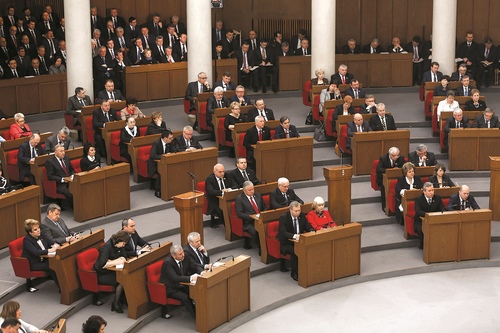
On the protection of information space
“It is not a secret that Belarus is ‘exposed’ to various information streams. Therefore, it is necessary to skilfully and systematically resist negative phenomena and to persistently carry out our line, while protecting the interests of Belarusian people and the state. It is necessary to stand against slander and various insinuations,” noted the President, adding that in due time there was an expression ‘To equate a feather with a bayonet’. “Such fighting spirit and ability to actively and professionally conduct discussions and to defend constructive position today is very important and our newspapers, magazines, TV channels and radio programmes (of the Republican and regional level) should add this to their armoury.”
On Belarusian nuclear power station
“We should use advantages of nuclear engineering to establish a cluster of power-consuming industries and to raise the competitiveness of the whole economy around the nuclear power plant. At the same time, today I’d like to publicly declare: we will have ‘oversupply’ of electric power after putting the nuclear power station into operation. I’ve quoted the word ‘oversupply’ since there should be no ‘oversupply’, if we correctly and timely prepare for it. Let’s reorganise our economy and our people to using electricity instead of natural gas and oil.”
Alexander Lukashenko brought an example of automobile manufacture which is guided by electromobiles more and more. The same refers to motorcycles and bicycles. “Why can’t we work over it today? Why not to re-orient our people towards electricity in everyday life? Thus, if we have the so-called ‘surplus’ of electric power, it is possible to reduce prices considerably. It is necessary to prepare for it today. It is a pending task.”
On integration
“The Government’s active position should be observed in realisation of the initiative aimed at integration of the Silk Road Economic Belt and the Eurasian Economic Union — to lift barriers and restrictions in trade,” the President said. At present, purchasing power at the traditional markets of our domestic produce’s selling — primarily, Russia and Ukraine — has fallen down. In this respect, Belarus cannot wait until it rises again. Accordingly — as Mr. Lukashenko explained, a task has been set to diversify Belarusian exports.
The key factor in export promotion is provision of the packet principle of sales — involving post-sales servicing, operative repair and additional services. It’s impossible to gain a foothold on foreign markets without these.
On de-dollarisation
It is necessary to put more efforts into the de-dollarisation of the national economy. A lot has been done in this regard. When the nation trusts its own currency, and saves money using it, this supports the national economy. Much has been done already to reduce the use of foreign currencies in transactions inside the country. Banks now offer lucrative terms that allow Belarusians to get real revenues from Rouble deposits. Mr. Lukashenko also drew attention to the fact that it is impossible to reduce the economy’s reliance on the Dollar without changing the nation’s attitudes and psychology, since Belarusians have grown accustomed to calculating everything in conditional currency units. “It is necessary to begin work with state agencies and to make decisions this year in order to set as many tax rates, duty rates, rental payments, and tariffs as possible in Belarusian Roubles instead of foreign currencies,” stressed the President.
On demography
The key task in the demographic sphere is to create favourable conditions for population growth. The President explained, “In the decade since the first state programme for the solution of demographic problems was adopted, we’ve achieved the expected result. In 2015, the birth rate almost equalled the death rate as close to 120,000 babies were born. We’ve not seen such birth rate figures for over twenty years.”
In 10 years, infant mortality has dropped to a third of its previous level putting Belarus in line with the leading countries. “It is a major achievement: when a woman is giving birth to a child and is fully convinced that her baby would be healthy. Thankfully, our Belarusian families are growing: over 56 percent of all new-borns are at least second children. This is a breakthrough,” Mr. Lukashenko said. “We’ll pay attention to families with many children in respect to their accommodation in the future,” he assured. “Investments in the family are investments in the future.”
On denomination
“Denomination is a new stage of the national monetary system’s development. It is conducted not simply to ensure convenient financial calculations. Through this measure, the Government and the National Bank stress their decisiveness and ability to ensure macroeconomic stability in the country — accordingly, low inflation, low interest rates and restoration of the economic activity will follow,” Mr. Lukashenko explained.
On teachers
Lecturing at universities should be focused on solving the present issues. “We, parliamentarians, should visit our universities where staff are trained and re-qualified more often. Training of specialists in line with economic needs is another important avenue. “Under modern conditions, it’s inadmissible to have a gap between the technical level of a new product and staff qualifications. Personnel re-training should be conducted directly at production facilities and at sites where specialists and heads would work. This is important for people to see new technologies, new production samples and new methods.”
On the pension system
“This year, issues of improvement of our pension system have produced much public reaction,” Mr. Lukashenko said. “While making a decision on the increase of the pension age and the pension reform, we should admit that we are in the tail of events. We should have settled this issue long ago. Nothing extraordinary is happening and our people have accepted the decision calmly.”
Meanwhile, according to the President, different variants of the problem solution were discussed, with a gradual increase of the retirement age being acknowledged the most reasonable. As for the principles of the pension system development, Mr. Lukashenko noted, “By preserving its solid distributive basis, we will further focus on other forms of pension plans, including the cumulative ones. By the way, such plans already exist in Belarus. Considering the situation in Russia and Ukraine, we did the right thing not to push for the cumulative system. Just look how many troubles they are facing because of this.”
On security
Belarus is interested in the creation of a multi-front security system in the Eurasian region. The President explained that, in this respect, the country is taking measures at the level of inter-state interaction and strengthening of Belarus’ defence potential. “We are not rattling sabres but we are seriously and openly speaking of the creation of a modern defence complex. This is part of the Belarusian-Russian regional defence system on the western border: The Belarusian army is the basis of it.”
The adoption of a new edition of the Belarusian Military Doctrine this year was noted as an important milestone in the enhancement of the country’s defensive capacity. “It clearly outlines the peaceful character of our foreign policy. The document envisages that to protect our country should non-military measures prove ineffective, we are ready to make use of military force against external aggression and to also neutralise a domestic armed conflict,” he said.
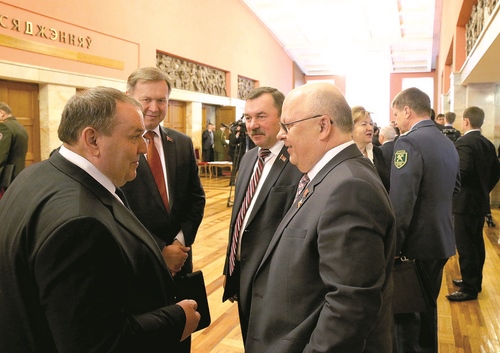
On law making
According to the President, both chambers of the Belarusian Parliament need to ensure succession after the forthcoming elections. “Around 30 percent or slightly less [we’d love to see in this convocation]. It’s important for the Parliament’s chambers to ensure succession, while preserving the stability and working capability of the supreme law making body,” Mr. Lukashenko noted. “We’ll address people with new candidates. These should not be pocket governors’ or someone else’s deputies. These must be the best people in our country capable of producing good results. Responsibility for the result will be also taken by public organisations which are promoting these deputies, and primarily the state authority. The Parliament’s present convocation deserves respect for its business style, productive law making and international activity,” Mr. Lukashenko stated.
On our country’s role in the global arena
The President believes that Belarus can and should play a more active and important role in global politics. “At present, Belarus is the pillar of security in the region. There are no religious or ethnic conflicts in our country. We have never created problems for our neighbours.” he said, adding that the Russian Federation is an ally and strategic partner of Belarus. “Accordingly, we need to dynamically develop all aspects of co-operation at inter-state and regional levels.”
On the fundamentals of state policy
“The care of people, the enhancement of their wellbeing and quality of life are the basis of state policy. This is our major principle and the key focus for development,” the Head of State said. “The set measures should contribute to overcoming negative tendencies and restoring the dynamics of our socio-economic development. To achieve this, co-ordinated work is needed — to ensure a common result both in the centre and in the regions.”
Direct speech
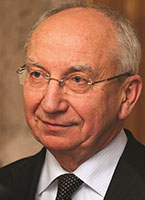
Anatoly Rusetsky, the Deputy Chairman of the Council of the Republic:
The Address is important since it focuses on the economic block. Problems and their solutions have been clearly set out. At present, the enhancement of our competitiveness is possible owing to decisions made at production facilities — including the reduction of costs and enhancement of production quality. These were highlighted in the Address. In addition, the key focus for state activity in the coming years was indicated. To achieve the set tasks, much depends nowadays on the efficiency of personnel policy and managers themselves. In my view, no revolutionary changes are needed in this respect. However, under difficult conditions, people will have to make hard decisions. I believe the key is for heads to really assess the situation in their organisations and companies and not be afraid to take on an initiative.
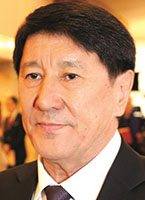
Yergali Bulegenov, the Ambassador Extraordinary and Plenipotentiary of Kazakhstan to Belarus:
Your President has previously stressed the importance of active participation in the integration process. In this respect, it’s necessary to note the strategic partnership established between Belarus and Kazakhstan. We need this co-operation to be continued and extended. The forthcoming meeting of our presidents will give impetus to further strengthening bilateral relations. Sadly, the unfavourable foreign economic market situation and the global financial crisis has a negative influence on the pace of Eurasian integration. Accordingly, we are trying to counteract foreign challenges and promote the plans outlined in the agreement for the establishment of the Eurasian Economic Union. We are all optimistic that we’ll be able to realise the plans, which have attracted an unexpected level of interest from abroad. An increasing number of states have expressed their desire to liaise with our Union including both our close neighbours and non-CIS states.
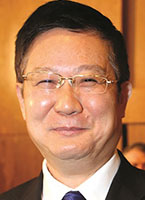
Cui Qiming, the Ambassador Extraordinary and Plenipotentiary of China to Belarus:
Belarus has great experience of building state, economy and society. You have wise leaders and the country enjoys political stability. A clear strategy for development is set out. With this in mind, I consider all the difficulties in the Belarusian economy are temporary and the authorities will soon overcome the challenges facing them. No doubt, the growth of successful Belarusian-Chinese relations will contribute to this. We share many common interests, particularly regarding the building of the Silk Road Economic Belt and the establishment of the Chinese-Belarusian Industrial Park. Of course, the world situation is very tense and it’s encouraging to observe Belarus’ peacekeeping role in the global arena. Your country’s heads greatly contribute to the strengthening of security in the region. No country is now able to adequately react to foreign challenges and threats alone. Efforts need to be joint and it’s necessary to achieve an equal dialogue based on mutual respect. The relations between Belarus and China are built on these principles.
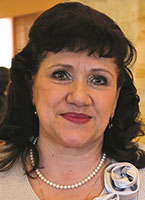
Natalia Guivik, a member of the Standing Committee on Law Making at the House of Representatives:
I was impressed by the warmth of the atmosphere at the Oval Hall. This was not merely a Presidential Address in its traditional sense but a live constructive dialogue between parliamentarians and the President. Deputies and senators asked the Head of State around fifteen questions and the President answered all of them in detail. Ten projects were outlined for implementation in the areas of economy and health protection, education and cultural improvement. I concluded that our state is preserving the social direction of its policy. The President shows great care for those who need support and help. These are primarily disabled people, families with many children and war veterans. I was also much impressed by Mr. Lukashenko’s appreciation of the deputies’ work (of the fifth convocation). He praised our role but called on us not to relax since parliamentary elections are scheduled for this year. These will be a test for the population’s political culture.
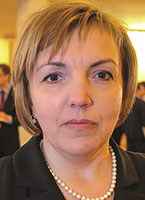
Olga Politiko, a member of the Standing Committee on Industry, Fuel-Energy Complex, Transport and Communication at the House of Representatives:
A major accent of the Address was made on the policy of employment. The task is to create no less than 50,000 jobs annually. This does not mean — conventionally speaking — that a truck should be put aside and shovels would be distributed among workers. Truly, we’ll have many employees then but the result of such move would be questionable. The President has another time stressed that these should be mostly highly productive jobs. To achieve this, new, high-tech productions are needed — which could be focused on exports and import substitution. In these issues, the Government and local authorities need to act proactively. The situation on the labour market is changeable and it’s important to react promptly.
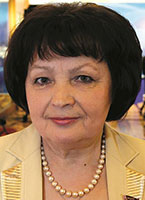
Zinaida Mandrovskaya, the Deputy Chair of the Standing Committee on Labour and Social Affairs at the House of Representatives:
The most important aspect of what I heard is the adherence to the state’s social policy. Expenditure on health protection, education and the social sphere has not been cut. We all understand however, that this is possible only on the condition that the economy develops normally and on the restoration of its basic indicators. The Address doesn’t simply outline avenues of activity for all — including tasks for the Government and Parliament on developing innovative and investment activity; it also envisages sources for financing the projects both now and in the future. I think it became clear to everyone (on the basis of what they heard) that each of us should become more active — including our universities, law makers and the Government.

Zygmund Valevach, a member of the Standing Committee on National Security at the House of Representatives:
IIn his Address, the President said that peace and security in our country is the major achievement of the state. This is the result of the provision of the state defence ability. On April 4th, the Military Doctrine was adopted at the first reading; it is now being partially amended ready for the second reading. However, even now we can assert that our Military Doctrine is of a defensive and peaceful character. In case of necessity, we’d use our Armed Forces and the military organisation’s forces to secure peace for our citizens. The President, the Defence Minister and representatives of other force structures are heavily involved in security measures; this is our great achievement.
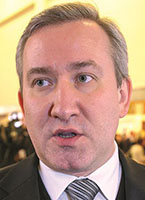
Marat Zhilinsky, the Rector of the Academy of Public Administration (under the aegis of the President of Belarus) and a member of the House of Representatives’ Standing Committee on Education, Culture and Science:
The Address confirmed the special attention paid by our President to personnel related issues. In his speech, the Head of State spoke of staff optimisation and ensuring jobs for the younger age group. He also paid attention to these issues while answering deputies’ questions. The main idea was to ensure staff optimisation - from the point of view of their management. This means that only professionals should remain in their places. The President clearly outlined the criteria under which the country’s economy would remain manageable — primarily, from the personnel point of view. As the Rector of the country’s main establishment preparing staff for state organisations, I view this as an assessment of our work and a serious message for further action.
Sincere talk
After his speech, the President answered parliamentarians’ questions — as is traditional
On Belarus’ WTO joining:
It’s important for us to be a part of this world economic mechanism. On the other hand, while joining the WTO, the countries — with which we shall agree and are agreeing at present — have their own interests. We’ll make this move if we see that we are not losing anything during the negotiation process.
On the possibility of labour pensions’ increase:
I was recently informed in a certain figure. In five years time, real earnings of the population have risen by 35 percent. It’s not always noticeable that pensions and salaries are growing: this is a human psychology. We’ll do our best to obligatory raise pensions in H2.
On our country’s prospects in economic and technological spheres:
The economy of knowledge is the only sphere which can save us as an independent and sovereign state, while multiplying our wealth. We’ll support any innovative project in the agriculture, tool and machine building. Importantly, these projects should pay for themselves.
On the fight against terrorism:
Here, in Belarus, we’ll do everything possible to oppose it — including taking a decision on fight against contract soldiers. These people return to us and they can war better than work at a plant. What path they’d choose as a result? They are eager to take weapons in their hands. Do we need this? Defence and security are serious matters which allow no joking.
On the establishment of a public association for protectors of the memory of the Great Patriotic War:
This issue is overseen by everyone — including youth, public-political, religious and state organisations. However, if this organisation will be prepared or is already created (which is not prohibited by our legislation), we’ll not oppose it.
On the feasibility of introducing religion studies into the school curriculum:
I would not do this. Let God give other states — including Russia — the same tolerance and interrelation of religions as observed in Belarus. Should we make this issue so actual? We’ll simply create problems from nowhere. No revolutionary steps should be made in this respect.
On state officers’ salaries:
It’s important to significantly increase the status of state officers, as well as their salaries. However, it’s initially necessary to optimise management apparatus, changing the system. We should keep only those aspects which work and bring benefits. We need to retain the specialists who will follow their obligations and accordingly be paid good salaries for their work.
Photo: BelTA









